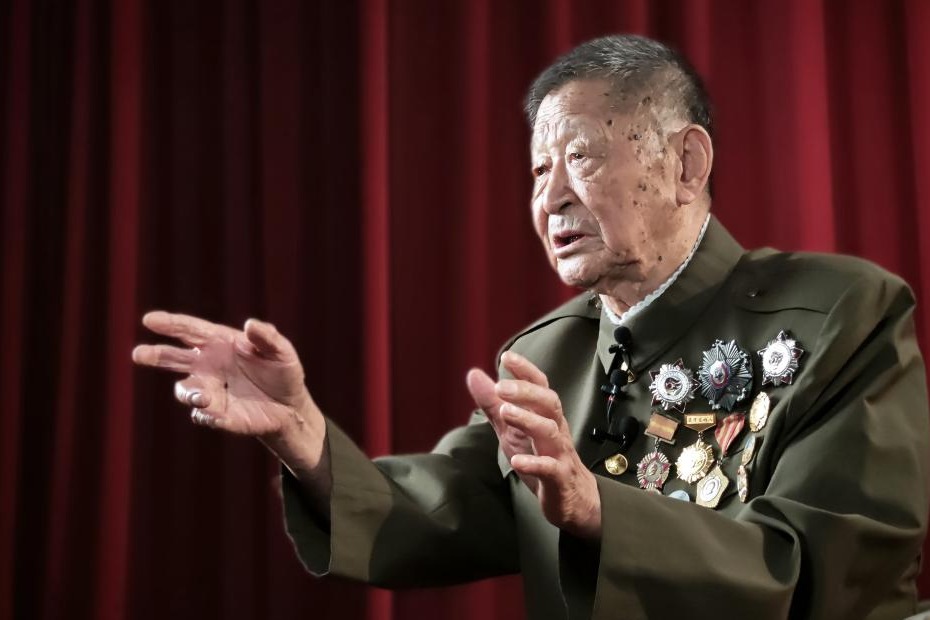China, world stand to benefit big from Xi's anti-corruption campaign
Share - WeChat

BEIJING - China has reaped enormous benefits from its ongoing nationwide anti-corruption campaign, which aims to forge cleaner governance and has so far proved effective. Benefits to the world at large are emerging.
Chasing corrupt officials from high-ranking "tigers" to "flies" at lower levels in the country in the past five years, Beijing also launched such operations as "Sky Net" and "Fox Hunt" overseas to hunt down fugitive venal officials.
As of March 31, China had captured 2,873 fugitives from over 90 countries and regions, and recovered some 130 million U.S. dollars,according to China's top anti-graft watchdog. Over 1,000 fugitives were brought back to China for justice in 2016.
"There is now almost no chance of escape," read a report released in April on the website of Central Commission for Discipline Inspection (CCDI) of the ruling Communist Party of China (CPC).
"LONG-AWAITED" CAMPAIGN
"What President Xi Jinping seems to be aspiring to is that China will embrace the best standard of corruption prevention," Bob Carr, former foreign minister of Australia, told Xinhua in a recent interview.
"If Xi succeeds, then he will have delivered on a major transformation on how China does business," said Carr. "That will be very good for the Chinese people. They will be the biggest winners out of that."
William J. Carroll, president emeritus of U.S. Benedictine University, also applauded Xi's anti-corruption engagement since "corruption on the part of government officials threatens the very fabric of society."
"While these individuals garner individual benefits, they erode the trust citizens have in their government, destroying harmony and thereby resulting in the dissolution of the society," he noted. "Xi has taken steps to eradicate the corruption within the government. If he is successful, China will be better for it."
In the eyes of Do Tien Sam, editor-in-chief of the China Research Journal published by Vietnam Academy of Social Sciences, corruption is a global phenomenon, but "more serious in transitional countries."
He said Xi's firm determination in striking embezzlement brings "many encouraging results which are long-awaited and appreciated by people not only from China."
"Fighting corruption concerns the survival of a ruling party," he said. "China is on a very right direction. The CPC's methods and actions in this fight is a very good reference for other Communist parties."
Peter J. Li, associate professor of University of Houston, argued that corruption, "if unchecked, can trigger social unrest and a legitimacy crisis. China's sustained development depends on the success of Xi's campaign," he said.
According to Macharia Munene, an international relations lecturer at Kenya's U.S. International University, China's "campaign against corruption comes out as a no-nonsense undertaking, especially as it ropes in 'big fish' within the party and the bureaucracy."
"The rest of the world can observe how determined effort on fighting corruption can lead to increasing prosperity and national credibility," Munene noted.
MORE EFFORTS EYED
Reaching out to the international society, China does not shy away from demonstrating its zero-tolerance of corruption to the world, and the readiness to cooperate with law enforcement agencies in other countries.
In May, China pledged to enhance cooperation with Cuba and Russia in fighting corruption, and take anti-corruption as a key area for consolidating partnership with the two nations.
In the same month, Foreign Minister Wang Yi told his United Arab Emirates' counterpart Sheikh Abdullah that China wishes to enhance cooperation in tracing corrupt fugitives and recovering their illegal properties overseas.
Earlier in April, the CCDI exposed the whereabouts and other information of 22 corrupt fugitives, urging them to surrender as soon as possible, the first time for China to do so.
According to the CCDI's report, 19 fugitive suspects fled China last year, compared with 31 in 2015 and 101 in 2014. The sharp decrease in the numbers indicates the important progress the watchdog has made to get back overseas corrupt fugitives and their illicit gains.
Dr. Gerishon Ikiara, senior lecturer on International Economics from the University of Nairobi, said China's severe and effective punishment for those corrupt offenders helps "reduce corruption substantially,compared with the rather soft measures applied in Western nations."
Still, more efforts should be made since "anti-corruption is a persistent war where soldiers cannot be impatient," Vietnam's Sam warned. "If not, corruption will come back, strong as it used to be, coming with people's distrust."
Patrick Chovanec, managing director of Silvercrest Asset Management Group LLC in New York, said that reforms to tackle corruption need to be implemented across government agencies and down to the provincial and local levels.
GLOBAL BENEFITS
China's anti-corruption efforts have bolstered the confidence of both the public and the global market in the government, said Enrique Dussel Peters, coordinator of the China-Mexico Studies Center (Cechimex) at the National Autonomous University of Mexico.
It also indicates that China will be more open to foreign investors and continue to reform its governance to provide more transparency and predictability, said New York's Chovanec.
Chen Fengying, research fellow at the China Institute of Contemporary International Relations, said the move "offers time-saving benefits for foreign investors, as they no longer need to cultivate relationships before starting a project."
Koh Chin Yee, CEO of Singapore Longus Research Institute, echoed the opinion, saying "the elimination of graft minimizes hidden costs, and eventually consumers benefit from it. To foreign investors, a market that is transparent and rule-based is more effective and efficient to handle."
Ron Mock, CEO of the Ontario Teachers' Pension Plan, said China's anti-corruption efforts in the financial sector "will make it a primary investing destination among Asian countries" for his company.
Abraham Vergara from Mexico's Iberoamerican University noted the anti-graft campaign has further cemented global confidence in trade and investment in China.
"In the meantime, Latin America should take note of China's anti-corruption campaign, said Cechimex's Dussel. "A good part of Latin America has a lot to learn from it."
James Laurenceson, deputy director of the Australia-China Relations Institute, also said dealing with corruption is particularly important now because "China's leadership has recognized (in) the next five years, this economy has to be driven by private sector-led innovation."
Chasing corrupt officials from high-ranking "tigers" to "flies" at lower levels in the country in the past five years, Beijing also launched such operations as "Sky Net" and "Fox Hunt" overseas to hunt down fugitive venal officials.
As of March 31, China had captured 2,873 fugitives from over 90 countries and regions, and recovered some 130 million U.S. dollars,according to China's top anti-graft watchdog. Over 1,000 fugitives were brought back to China for justice in 2016.
"There is now almost no chance of escape," read a report released in April on the website of Central Commission for Discipline Inspection (CCDI) of the ruling Communist Party of China (CPC).
"LONG-AWAITED" CAMPAIGN
"What President Xi Jinping seems to be aspiring to is that China will embrace the best standard of corruption prevention," Bob Carr, former foreign minister of Australia, told Xinhua in a recent interview.
"If Xi succeeds, then he will have delivered on a major transformation on how China does business," said Carr. "That will be very good for the Chinese people. They will be the biggest winners out of that."
William J. Carroll, president emeritus of U.S. Benedictine University, also applauded Xi's anti-corruption engagement since "corruption on the part of government officials threatens the very fabric of society."
"While these individuals garner individual benefits, they erode the trust citizens have in their government, destroying harmony and thereby resulting in the dissolution of the society," he noted. "Xi has taken steps to eradicate the corruption within the government. If he is successful, China will be better for it."
In the eyes of Do Tien Sam, editor-in-chief of the China Research Journal published by Vietnam Academy of Social Sciences, corruption is a global phenomenon, but "more serious in transitional countries."
He said Xi's firm determination in striking embezzlement brings "many encouraging results which are long-awaited and appreciated by people not only from China."
"Fighting corruption concerns the survival of a ruling party," he said. "China is on a very right direction. The CPC's methods and actions in this fight is a very good reference for other Communist parties."
Peter J. Li, associate professor of University of Houston, argued that corruption, "if unchecked, can trigger social unrest and a legitimacy crisis. China's sustained development depends on the success of Xi's campaign," he said.
According to Macharia Munene, an international relations lecturer at Kenya's U.S. International University, China's "campaign against corruption comes out as a no-nonsense undertaking, especially as it ropes in 'big fish' within the party and the bureaucracy."
"The rest of the world can observe how determined effort on fighting corruption can lead to increasing prosperity and national credibility," Munene noted.
MORE EFFORTS EYED
Reaching out to the international society, China does not shy away from demonstrating its zero-tolerance of corruption to the world, and the readiness to cooperate with law enforcement agencies in other countries.
In May, China pledged to enhance cooperation with Cuba and Russia in fighting corruption, and take anti-corruption as a key area for consolidating partnership with the two nations.
In the same month, Foreign Minister Wang Yi told his United Arab Emirates' counterpart Sheikh Abdullah that China wishes to enhance cooperation in tracing corrupt fugitives and recovering their illegal properties overseas.
Earlier in April, the CCDI exposed the whereabouts and other information of 22 corrupt fugitives, urging them to surrender as soon as possible, the first time for China to do so.
According to the CCDI's report, 19 fugitive suspects fled China last year, compared with 31 in 2015 and 101 in 2014. The sharp decrease in the numbers indicates the important progress the watchdog has made to get back overseas corrupt fugitives and their illicit gains.
Dr. Gerishon Ikiara, senior lecturer on International Economics from the University of Nairobi, said China's severe and effective punishment for those corrupt offenders helps "reduce corruption substantially,compared with the rather soft measures applied in Western nations."
Still, more efforts should be made since "anti-corruption is a persistent war where soldiers cannot be impatient," Vietnam's Sam warned. "If not, corruption will come back, strong as it used to be, coming with people's distrust."
Patrick Chovanec, managing director of Silvercrest Asset Management Group LLC in New York, said that reforms to tackle corruption need to be implemented across government agencies and down to the provincial and local levels.
GLOBAL BENEFITS
China's anti-corruption efforts have bolstered the confidence of both the public and the global market in the government, said Enrique Dussel Peters, coordinator of the China-Mexico Studies Center (Cechimex) at the National Autonomous University of Mexico.
It also indicates that China will be more open to foreign investors and continue to reform its governance to provide more transparency and predictability, said New York's Chovanec.
Chen Fengying, research fellow at the China Institute of Contemporary International Relations, said the move "offers time-saving benefits for foreign investors, as they no longer need to cultivate relationships before starting a project."
Koh Chin Yee, CEO of Singapore Longus Research Institute, echoed the opinion, saying "the elimination of graft minimizes hidden costs, and eventually consumers benefit from it. To foreign investors, a market that is transparent and rule-based is more effective and efficient to handle."
Ron Mock, CEO of the Ontario Teachers' Pension Plan, said China's anti-corruption efforts in the financial sector "will make it a primary investing destination among Asian countries" for his company.
Abraham Vergara from Mexico's Iberoamerican University noted the anti-graft campaign has further cemented global confidence in trade and investment in China.
"In the meantime, Latin America should take note of China's anti-corruption campaign, said Cechimex's Dussel. "A good part of Latin America has a lot to learn from it."
James Laurenceson, deputy director of the Australia-China Relations Institute, also said dealing with corruption is particularly important now because "China's leadership has recognized (in) the next five years, this economy has to be driven by private sector-led innovation."
- Xi says Chinese people will never forget international friends
- Xi says great times call for heroes
- Xi: CPC leads Chinese nation in creating two miracles over past 75 years
- Xi calls for forming mighty force to build strong China
- Xi reiterates China's commitment to safeguarding world peace, boosting common development
- Xi addresses ceremony awarding China's highest state honors





































